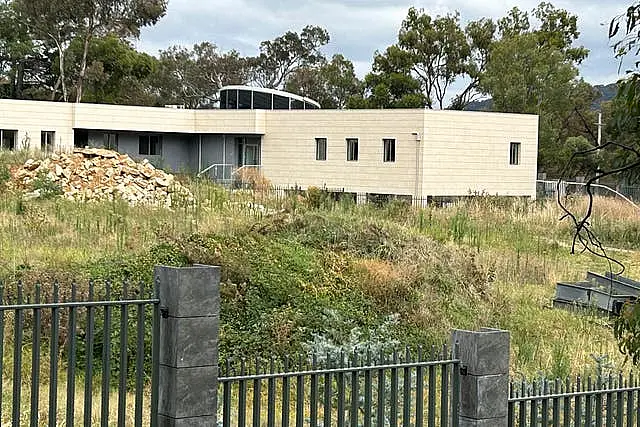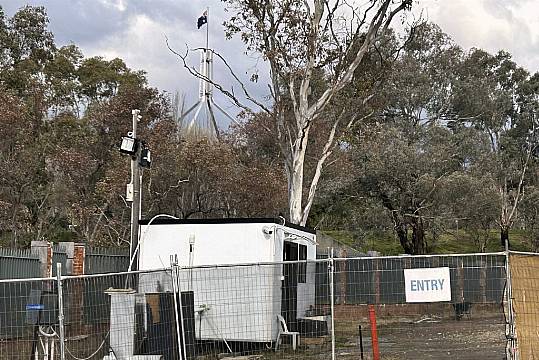A suspected lone Russian diplomat is apparently squatting on the site of Moscow’s proposed embassy in Canberra after the Australian government vetoed the plan on security grounds.
Prime Minister Anthony Albanese dismissed the Russian act of defiance in occupying the site in the capital, saying a “bloke standing in the cold on a bit of grass in Canberra is not a threat to our national security”.
Mr Albanese said he was confident that the eviction would stand up to any Russian legal challenge.

Parliament passed emergency legislation last week blocking on security grounds Russia’s lease on the largely empty block because the new embassy would have been too close to Parliament House.
A man has been living in a portable building on the site since Sunday, when passers-by first saw Australian Federal Police outside the fenced block in the Yarralumla diplomatic precinct.
The Russian Embassy refused to comment on media reports that the man seen smoking cigarettes outside his accommodation was a Russian diplomat.
The embassy also declined to explain why the man was on the site, saying in an email: “The Embassy does not comment (on) this.”
Mr Albanese said the issue would be “resolved” but did not say how.
“Australia will stand up for our values and we will stand up for our national security and a bloke standing in the cold on a bit of grass in Canberra is not a threat to our national security,” he told reporters in a courtyard outside his Parliament House office.

Russia later informed Canberra it intended to challenge the scrapping of the lease in the High Court on constitutional grounds, an Australian government statement said.
“Russia’s challenge to the validity of the law is not unexpected,” the statement said. “This is part of the Russian playbook.”
An injunction hearing has been listed for Monday, government officials said.
Australian National University international law expert Don Rothwell said occupying the site gave Russia no advantage in any legal challenge to their eviction.
“What they’re doing is diplomatic civil disobedience in terms of indicating their displeasure with the action of the Australian government,” he said.
Russia’s only potential for a successful legal challenge was over the amount of compensation Australia offers for money already spent on construction and earthworks, Mr Rothwell said.
Moscow says it has spent 5.5 million Australian dollars (£2.9 million) on the site since it was granted the lease in 2008. Completed works include fencing and a single perimeter building that was to be part of a planned complex of several buildings.

If the man is a diplomat, he could claim diplomatic immunity if detained by police, who would then have to set him free.
The government could declare him persona non grata, which would mean his diplomatic immunity was revoked. Such people are usually given 48 hours to leave Australia or face arrest.
Russia could then send another diplomat to take his place, said Mr Rothwell.
Mr Albanese said: “We actually support the law. Russia has not been real good at the law lately.”
Police advised reporters at the site on Thursday not to cross the perimeter fence or gate which was chained and padlocked from the inside.
A hand occasionally shifting blinds was the only evidence anyone was inside the small cabin.
Russia last week accused Australia of “Russophobic hysteria” for cancelling the lease, after a deterioration in relations since the Ukraine war began last year.







